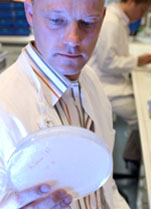← students

| First name: | Thomas |
| Last name: | Holler |
| Country: | Germany |
Thesis Subject:Physiological Analysis of Organisms involved in the Anaerobic Oxidation of Methane
| Education: | |
| Since 2003 PhD candidate of the International Max Planck Research School of Marine Microbiology (MarMic), Max Planck Institute for Marine Microbiology, Bremen, Germany | |
| 2003 Diploma thesis at Max Planck Institute for Marine Microbiology, Bremen, Germany | |
| 2000-2003
Main studys in Microbiology, Cell Biology, Biochemistry, University of Bremen, Germany |
|
| 1998-2000
Basic studies in Biology University of Bremen, Germany |
Scientific Interests and Goals:The main objective of my study is to investigate the microbially mediated anaerobic oxidation of methane (AOM). AOM is a widespread process in marine sediments. Geochemical profiles and in vitro experiments show a link to sulfate reduction. Field and laboratory studies indicate that AOM is mediated by a syntrophic association of archaea and bacteria, but the exact nature of their relationship and the mechanisms underlying AOM remain uncertain.
A comprehensive understanding of AOM and the physiology of the organisms involved will undoubtedly require their cultivation. So far, no cultivation based approaches have allowed a complete understanding of the mechanism underlying AOM, and no pure or axenic binary cultures of methane-oxidizing anaerobic organisms have been obtained. Therefore, I started or continued with enrichment cultures from different marine habitats, in the absence of oxygen, with methane as sole electron donor and sulfate as electron acceptor. The main goal was to enrich the organisms involved in AOM and to end up with an accurately defined culture.
For these cultures the analysis of stable carbon and hydrogen isotopic signatures of methane, and radiotracer techniques were used to analyse possible pathways qualitatively and quantitatively.
A comprehensive understanding of AOM and the physiology of the organisms involved will undoubtedly require their cultivation. So far, no cultivation based approaches have allowed a complete understanding of the mechanism underlying AOM, and no pure or axenic binary cultures of methane-oxidizing anaerobic organisms have been obtained. Therefore, I started or continued with enrichment cultures from different marine habitats, in the absence of oxygen, with methane as sole electron donor and sulfate as electron acceptor. The main goal was to enrich the organisms involved in AOM and to end up with an accurately defined culture.
For these cultures the analysis of stable carbon and hydrogen isotopic signatures of methane, and radiotracer techniques were used to analyse possible pathways qualitatively and quantitatively.
Selected Publications:Alain, K., T. Holler, F. Musat, M. Elvert, T. Treude and M. Krüger, Microbiological investigation of methane- and hydrocarbon-discharging mud volcanoes in the Carpathian Mountains, Romania., 2006 Environmental Microbiology 8: 574-590


